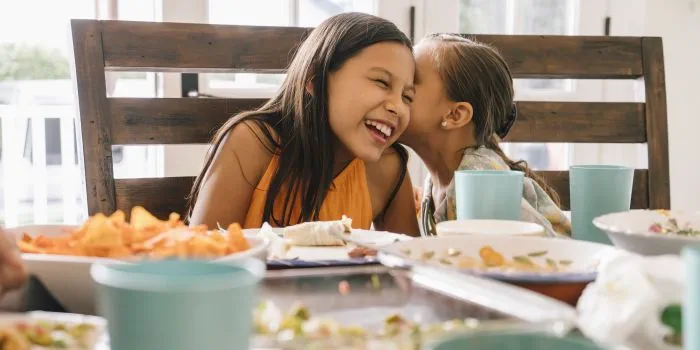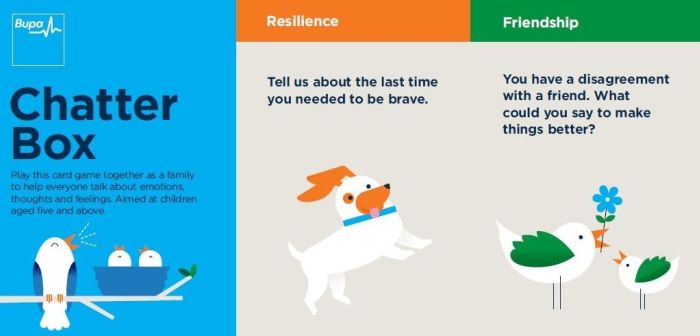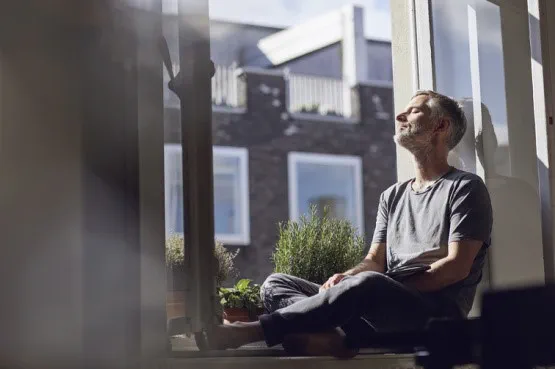How to speak to your child about their feelings (Activity)
Growing up can be difficult. Young people experience lots of physical and mental changes as they grow. The experiences they have during this time of development can also impact their future mental health and emotional skills.
Helping your child express how they feel can help them feel supported and can help you learn about any problems they’re experiencing sooner.
Here, we offer a fun activity you can do with young people to help start healthy conversations about their emotions.

What can affect a child’s mental health?
Mental health problems among children and young people are increasing. Lots of different experiences in a young person’s life can have an impact on their mental health and wellbeing. These can range from:
- life changes such as moving house or school
- the arrival of a new sibling
- being bullied
- bereavement
Starting a conversation with your child about their feelings can sometimes be difficult, and you might not know where to begin. Activities like the chatter box cards game below can help your loved one feel more comfortable talking about their emotions.
You might also like to try making an art box where your child can draw and paint to express how they’re feeling. Or they could try keeping a mood journal as another way for them to express and record their emotions.
Chatter box cards activity
These chatter box cards are a fun activity for you and your child to play together. They’re designed to encourage healthy conversations about mental wellbeing.
We’ve created these cards for primary school aged children of around five years and older. There are a couple of ways you can play. You could try:
- Sticking one of the cards up on the fridge each day, and each family member answers the question by the end of the day.
- Or, take it in turns at the dinner table to pick a card for everyone to answer.
You could also encourage your child to invent their own ways to play and use these cards.
Download the cards here (PDF, 0.5MB).
The cards are divided into five themes:
- managing emotions
- gratitude
- friendships
- resilience
- just for fun!
Managing emotions
- Act out an emotion you felt today.
- What helps you feel calm?
- Have you felt worried or scared this week? How did you react?
- If you feel sad, would you rather talk about your feelings or do something to take your mind off it?
Gratitude
- Look around the room and find something you’re grateful for, explain why.
- What was the best moment you had today?
- If you had to name just one thing you’re grateful for, what would it be?
Friendships
- Who did you like talking to this week? What made it good?
- You have a disagreement with a friend. What could you say to make things better?
- Name one way you helped another person this week.
- What is one way you can make a new friend?
Resilience
- Name something you achieved this week.
- Think of someone who has acted like a leader recently. What did they do or say?
- Your friend is having a hard time learning a new skill. What would you say to encourage them?
- Tell us about the last time you needed to be brave.
Just for fun!
- If you were an ice-cream flavour, what would you be and why?
- If you were stranded on a deserted island and could take three things with you, what would they be and why?
- If you and your family had your own reality TV show, what would you call it and why?
- If you could be famous for something, what would it be and why?
- If you could change one thing in the world, what would it be?
- If you could create a video game, what would it be about and what would you call it?
- What cartoon character would you most like to be and why?
- If you had to give everyone in your family new names, what would they be and why?
- Do a dance to express how you’re feeling right now.
There’s also some space for your child to create and draw their own cards too.
We now offer GP appointments for children under 18. Find out more about our Under 18 GP Service, call us on 0330 822 3072.
-
Sources Sources
- Improving the mental and brain health of children and adolescents. World Health Organization (WHO). Who.int. Accessed July 2023
- Children’s Mental Health Awareness Week 2021: Express yourself. Mental Health Foundation. mentalhealth.org.uk. Published 1 February 2021
- Children and young people. Mental Health Foundation. mentalhealth.org.uk. Last updated 12 August 2021
- Promoting mental health and wellbeing. NSPCC Learning. Learning.nspcc.org.uk. Last updated 24 June 2021
About our health information
At Bupa we produce a wealth of free health information for you and your family. This is because we believe that trustworthy information is essential in helping you make better decisions about your health and wellbeing.
Our information has been awarded the PIF TICK for trustworthy health information. It also follows the principles of the The Information Standard.

More mental health and wellbeing articles
Did you find our advice helpful?
We’d love to hear what you think. Our short survey takes just a few minutes to complete and helps us to keep improving our healthy lifestyle articles.
Legal disclaimer
This information was published by Bupa's Health Content Team and is based on reputable sources of medical evidence. It has been reviewed by appropriate medical or clinical professionals and deemed accurate on the date of review. Photos are only for illustrative purposes and do not reflect every presentation of a condition.
Any information about a treatment or procedure is generic, and does not necessarily describe that treatment or procedure as delivered by Bupa or its associated providers.
The information contained on this page and in any third party websites referred to on this page is not intended nor implied to be a substitute for professional medical advice nor is it intended to be for medical diagnosis or treatment. Third party websites are not owned or controlled by Bupa and any individual may be able to access and post messages on them. Bupa is not responsible for the content or availability of these third party websites. We do not accept advertising on this page.








